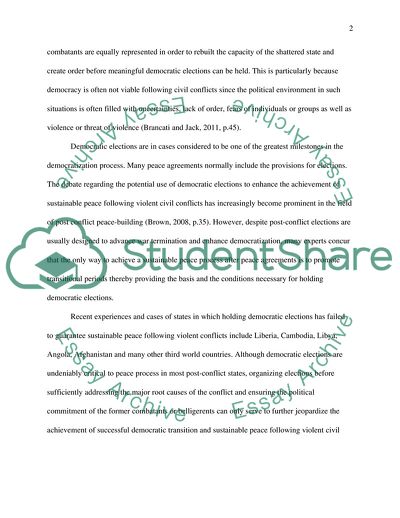Cite this document
(Do Democratic Elections offer the Best Chance of Achieving a Coursework Example | Topics and Well Written Essays - 2250 words, n.d.)
Do Democratic Elections offer the Best Chance of Achieving a Coursework Example | Topics and Well Written Essays - 2250 words. https://studentshare.org/politics/1847615-do-democratic-elections-offer-the-best-chance-of-achieving-a-sustainable-peace-following-violent-civil-conflict-use-examples-to-support-your-answer
Do Democratic Elections offer the Best Chance of Achieving a Coursework Example | Topics and Well Written Essays - 2250 words. https://studentshare.org/politics/1847615-do-democratic-elections-offer-the-best-chance-of-achieving-a-sustainable-peace-following-violent-civil-conflict-use-examples-to-support-your-answer
(Do Democratic Elections Offer the Best Chance of Achieving a Coursework Example | Topics and Well Written Essays - 2250 Words)
Do Democratic Elections Offer the Best Chance of Achieving a Coursework Example | Topics and Well Written Essays - 2250 Words. https://studentshare.org/politics/1847615-do-democratic-elections-offer-the-best-chance-of-achieving-a-sustainable-peace-following-violent-civil-conflict-use-examples-to-support-your-answer.
Do Democratic Elections Offer the Best Chance of Achieving a Coursework Example | Topics and Well Written Essays - 2250 Words. https://studentshare.org/politics/1847615-do-democratic-elections-offer-the-best-chance-of-achieving-a-sustainable-peace-following-violent-civil-conflict-use-examples-to-support-your-answer.
“Do Democratic Elections Offer the Best Chance of Achieving a Coursework Example | Topics and Well Written Essays - 2250 Words”. https://studentshare.org/politics/1847615-do-democratic-elections-offer-the-best-chance-of-achieving-a-sustainable-peace-following-violent-civil-conflict-use-examples-to-support-your-answer.


